Mental Health Center Financial Model
This 5-Year, 3-Statement Financial Model for a Mental Health Center in MS Excel includes revenue streams from Subscription to project-based services, set-up fees and consulting. Financial statements are needed to forecast the financial health of your mental health center.
Financial Model for a Mental Health Center
1. Revenue Model
The revenue model for a mental health center depends on its business model, which may include:
- Subscription-Based Services (e.g., therapy sessions, medication services)
- One-Time Product Sales (e.g., firewall software, encryption tools)
- Consulting Services (crisis intervention)
- Grants and Donations
Revenue is categorized as:
- Recurring Revenue (subscriptions, managed services)
- Non-Recurring Revenue (project-based therapy, consulting services)
Income Statement (Profit and Loss Statement)
The Income Statement shows the Mental Health Center’s profitability over a specific period. It includes:
1.1 Revenues:
- Patient Service Revenue:
- Individual Therapy Sessions
- Group Therapy Sessions
- Psychiatric Evaluations
- Medication Management Services
- Crisis Intervention Services
- Insurance Reimbursements:
- Private Insurance
- Medicaid/Medicare
- Grants and Donations:
- Government Grants
- Private Donors
- Nonprofit Funding
- Other Income:
- Community Outreach Programs
- Training/Workshops
- Income from Renting Space
1.2 Cost of Services (COGS):
- Therapist Salaries and Benefits
- Psychiatric Staff Costs
- Medical Supplies and Equipment
- Therapy Materials (e.g., workbooks, art supplies)
1.3 Gross Profit:
Formula: Gross Profit = Revenues – COGS
1.4 Operating Expenses:
- Salaries and Wages: Administrative and support staff
- Rent and Utilities: Office space, electricity, internet, water
- Marketing and Outreach: Advertising, community engagement
- Insurance: Malpractice, liability, workers’ compensation
- Technology and Software: Telehealth platforms, EMR (Electronic Medical Records)
- Training and Development: Continuing education for staff
- Depreciation and Amortization: Equipment, furniture, leasehold improvements
1.5 Operating Profit:
Formula: Operating Profit = Gross Profit – Operating Expenses
1.6 Non-Operating Items:
- Interest Expense on Loans
- Investment Income (if applicable)
1.7 Net Profit (Bottom Line):
Formula: Net Profit = Operating Profit + Non-Operating Items
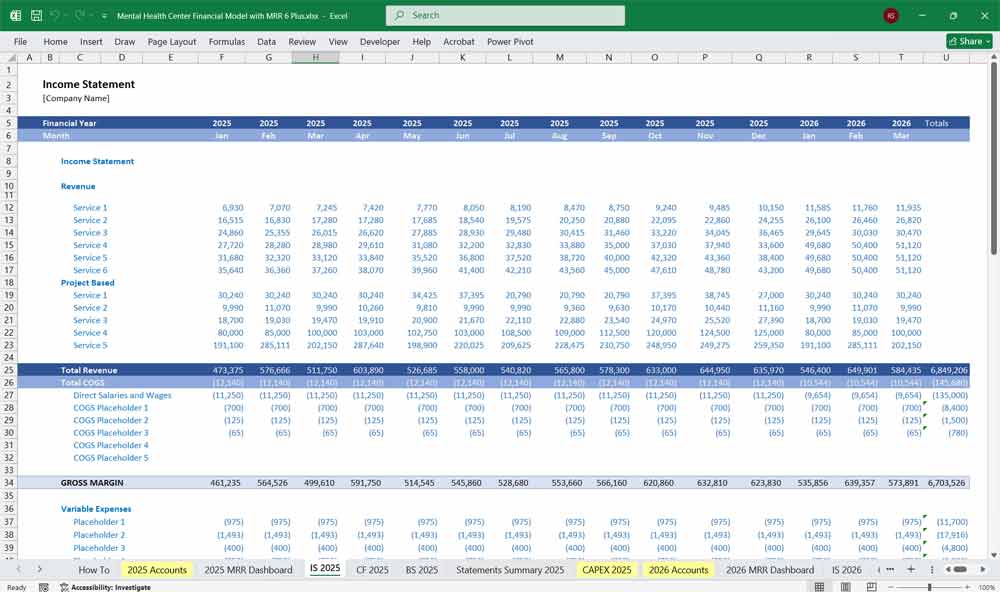
Mental Health Center Cash Flow Statement
The Cash Flow Statement tracks cash movements, ensuring liquidity for ongoing operations.
2.1 Cash Flow from Operating Activities:
- Cash Inflows:
- Payments from Patients
- Insurance Reimbursements
- Grant Disbursements
- Cash Outflows:
- Staff Salaries and Benefits
- Rent and Utilities
- Supplies and Medications
- Marketing and Outreach
- Administrative Expenses
Net Operating Cash Flow:
Formula: Operating Cash Flow = Cash Inflows – Cash Outflows
2.2 Cash Flow from Investing Activities:
- Cash Inflows:
- Sale of Equipment
- Sale of Investments (if applicable)
- Cash Outflows:
- Purchase of Equipment
- Office Renovations
- Technology Upgrades
2.3 Cash Flow from Financing Activities:
- Cash Inflows:
- Loan Proceeds
- Equity Contributions
- Cash Outflows:
- Loan Repayments
- Interest Payments
2.4 Net Cash Flow:
Formula: Net Cash Flow = Operating + Investing + Financing Cash Flows
2.5 Cash at Beginning and End of Period:
Formula: Ending Cash = Beginning Cash + Net Cash Flow
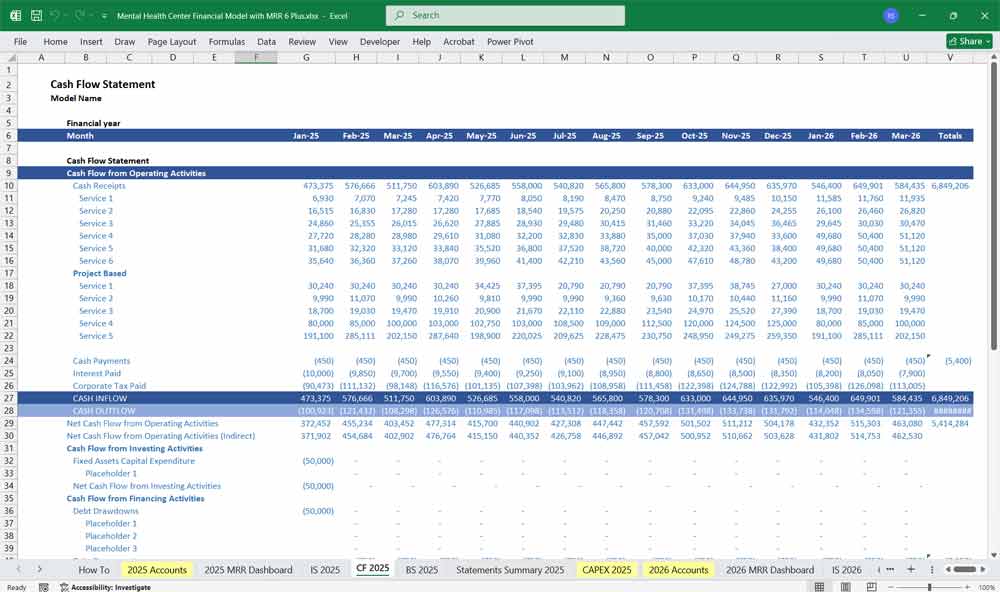
Mental Health Center Balance Sheet
The Balance Sheet shows the Mental Health Center’s financial position at a specific point in time.
3.1 Assets:
- Current Assets:
- Cash and Cash Equivalents
- Accounts Receivable (insurance claims, patient payments)
- Grants Receivable
- Prepaid Expenses (e.g., insurance, rent)
- Non-Current Assets:
- Property, Plant, and Equipment (PPE)
- Medical Equipment
- Office Furniture
- Intangible Assets (e.g., software licenses)
3.2 Liabilities:
- Current Liabilities:
- Accounts Payable
- Salaries Payable
- Short-term Loans
- Deferred Revenue (prepaid services)
- Non-Current Liabilities:
- Long-term Loans
- Lease Obligations
3.3 Equity:
- Retained Earnings:
- Accumulated Profits
- Contributed Capital:
- Owner’s/Investor’s Equity
- Net Income for the Period:
3.4 Balance Sheet Equation:
Formula: Assets = Liabilities + Equity
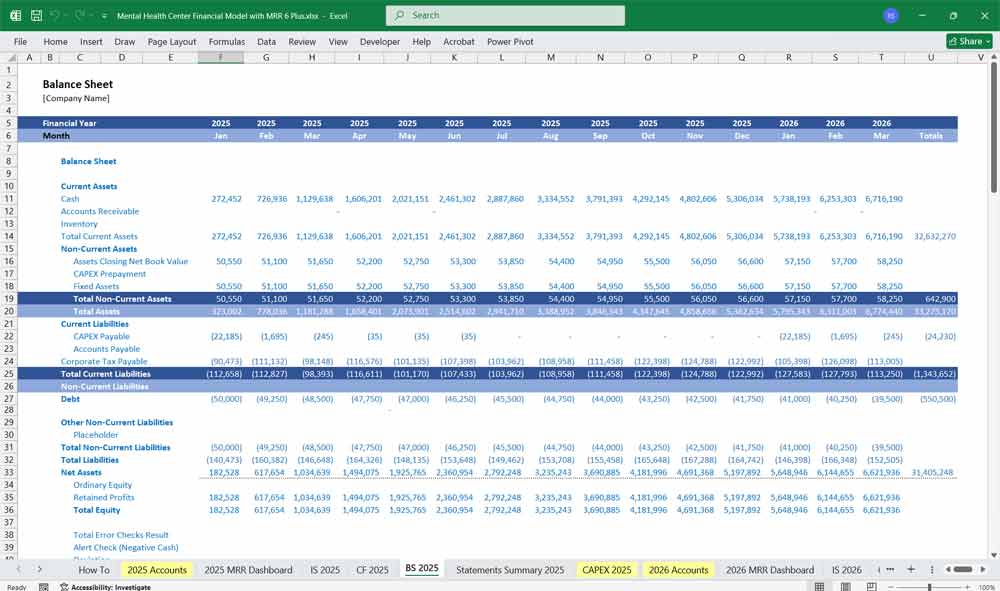
6-Tier Subscription Model for a Mental Health Center
Each tier progressively offers more advanced features, psychiatric evaluations, and support, catering to different patient requirements.
Basic Tier – “Foundation Mental Health Care”
Target Audience: Individuals seeking occasional support or preventive care.
Price Range: $50–$100 per month
Included Services:
- Monthly Check-In: 1 virtual or in-person session per month (30 minutes)
- 24/7 Support Line Access: Text or email-based support for quick mental health check-ins
- Self-Help Resources: Access to online articles, guided meditations, and worksheets
- Mental Health Assessment: One initial mental health assessment with personalized feedback
Benefits: Provides affordable access to professional guidance and helps build early coping strategies.
Essential Tier – “Mental Health Support Pathway”
Target Audience: Individuals managing mild mental health challenges or seeking regular support.
Price Range: $150–$200 per month
Included Services:
- Bi-Weekly Sessions: 2 virtual or in-person therapy sessions per month (45 minutes each)
- On-Demand Messaging: Therapist messaging support with a 24-hour response time
- Personalized Wellness Plan: Tailored action plan for stress management and emotional well-being
- Access to Group Therapy: Participation in 1 group therapy session per month
- Resource Library: Access to webinars, workbooks, and mindfulness exercises
Benefits: Provides regular therapy sessions and access to group support for deeper emotional work.
Advanced Tier – “Recovery Focus on Mental Health”
Target Audience: Individuals with moderate mental health needs, such as anxiety or depression.
Price Range: $250–$350 per month
Included Services:
- Weekly Therapy Sessions: 4 sessions per month (50 minutes each)
- Crisis Support Line: Priority access to crisis intervention services
- Customized Treatment Plan: Developed in collaboration with a licensed therapist
- Family Sessions: 1 family session per quarter to support home environment healing
- Progress Tracking: Monthly progress reports and therapist feedback
- Access to Support Groups: Unlimited access to specialized support groups (e.g., anxiety, grief)
Benefits: Offers more frequent therapy and personalized treatment plans for ongoing challenges.
Intensive Mental Health Tier – “Resilience Builder”
Target Audience: Individuals with more complex needs, requiring intensive support.
Price Range: $400–$500 per month
Included Services:
- Multiple Sessions Per Week: Up to 2 therapy sessions per week
- Psychiatric Consultation: 1 initial evaluation and quarterly medication management (if needed)
- Personalized Wellness Coaching: Bi-weekly check-ins with a wellness coach
- Therapeutic Workshops: Access to workshops on coping skills, trauma recovery, and emotional regulation
- Emergency Support: Same-day therapist responses and priority crisis support
- Holistic Care Package: Mindfulness exercises, nutrition guidance, and sleep improvement resources
Benefits: Provides comprehensive support through frequent therapy and holistic well-being strategies.
Premium Mental Health Tier – “Transformational Care”
Target Audience: Individuals needing specialized care or ongoing management of chronic mental health conditions.
Price Range: $600–$800 per month
Included Services:
- Unlimited Therapy Sessions: Unlimited access to therapy sessions as needed
- Dedicated Care Coordinator: Personalized care management, appointment scheduling, and support navigation
- Medication Management: Monthly psychiatric evaluations and prescription management
- Intensive Family Support: Family therapy and education sessions
- Customized Wellness Retreats: Invitations to exclusive weekend retreats focused on mental health and relaxation
- Access to All Programs: Full access to support groups, workshops, and wellness activities
Benefits: Provides a highly personalized, all-encompassing treatment plan with 24/7 support.
Platinum Mental Health Tier – “Executive Wellness”
Target Audience: Executives, high-performing professionals, or individuals seeking elite mental health center services.
Price Range: $1,000+ per month
Included Services:
- Unlimited Therapy with Senior Clinicians: Access to top therapists or psychiatrists
- On-Call Mental Health Concierge: 24/7 direct line to a personal therapist or counselor
- Executive Coaching: Performance psychology and executive stress management
- Private Sessions and Discretion: Private booking with anonymous billing and exclusive access
- Holistic Wellness Program: Custom mental health plans incorporating mindfulness, nutrition, and physical health
- VIP Retreats and Events: Invitations to luxury wellness retreats, networking events, and exclusive seminars
Benefits: Provides top-tier mental health care with unparalleled privacy, access, and holistic support.
Additional Considerations:
- Break-even Analysis:
- Calculate the number of sessions required to cover all fixed and variable costs.
- Key Performance Indicators (KPIs):
- Average Revenue per Patient
- Therapist Utilization Rate
- Client Retention Rate
- Days in Accounts Receivable
Editable Revenues Within The Model
Individual Mental Health Therapy Sessions
Individual mental health therapy sessions provide a safe, confidential space for individuals to explore their thoughts, emotions, and behaviors with a trained therapist. These one-on-one sessions help address issues such as anxiety, depression, trauma, and stress while promoting self-awareness and coping strategies. Therapists use evidence-based approaches tailored to the individual’s needs, fostering personal growth, emotional healing, and improved mental well-being. Whether short-term or long-term, these sessions empower individuals to develop healthier thought patterns and build resilience.
Mental Health Group Therapy Sessions
Mental health group therapy sessions bring together individuals facing similar challenges in a supportive, structured environment led by a trained therapist. These sessions encourage shared experiences, peer feedback, and collective learning, helping participants feel less isolated while developing coping strategies. Group therapy fosters connection, empathy, and social skills as members discuss topics like anxiety, depression, or addiction in a safe, confidential setting. By engaging with others, individuals gain new perspectives, build resilience, and reinforce progress in their mental health journey.
Mental Health Evaluations
Mental health psychiatric evaluations are comprehensive assessments conducted by a psychiatrist or other qualified mental health professional to diagnose and develop treatment plans for psychological conditions. These evaluations typically include a detailed review of the individual’s medical history, symptoms, behaviors, and emotional state, as well as possible psychological testing or lab work. The goal is to identify mental health disorders—such as depression, bipolar disorder, anxiety, or schizophrenia—and determine the most effective interventions, which may include medication, therapy, or other supports. Psychiatric evaluations provide a foundation for personalized care, ensuring individuals receive the appropriate treatment for their specific needs.
Mental Health And Medication Management Services
Medication Management in Mental Health Services involves the careful supervision of psychiatric medications by a qualified provider, such as a psychiatrist or psychiatric nurse practitioner. This process includes evaluating the effectiveness of prescribed medications, monitoring for side effects, and adjusting dosages or medications as needed to optimize treatment outcomes. Regular follow-up appointments ensure that the prescribed regimen aligns with the individual’s symptoms and overall mental health goals. Medication management is often combined with therapy and other interventions to provide a holistic approach to mental wellness, helping individuals stabilize mood, reduce symptoms, and improve daily functioning.
Crisis Mental Health Intervention Services
Providing immediate support to individuals experiencing severe emotional distress, “Crisis Mental Health Intervention Services”, and psychiatric emergencies, or suicidal ideation services, are often available through hotlines, mobile crisis teams, or emergency departments, offer rapid assessment, de-escalation, and stabilization to ensure safety. Trained professionals intervene with compassionate care, connecting individuals to urgent resources such as hospitalization, crisis counseling, or follow-up treatment. The goal is to reduce harm, restore stability, and guide individuals toward long-term support, ensuring no one faces a mental health crisis alone. These interventions are critical in preventing escalation and promoting recovery during acute episodes.
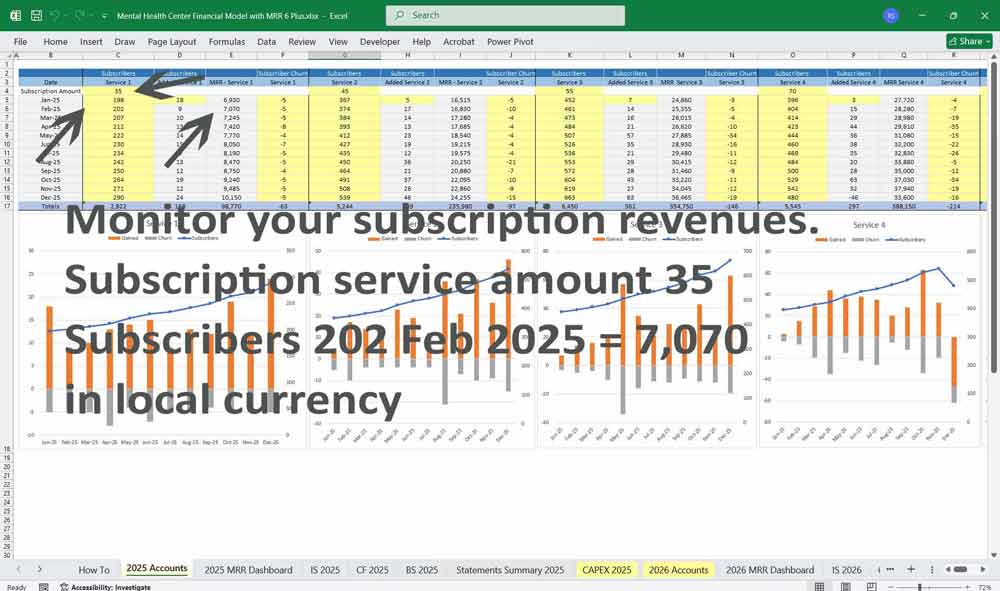
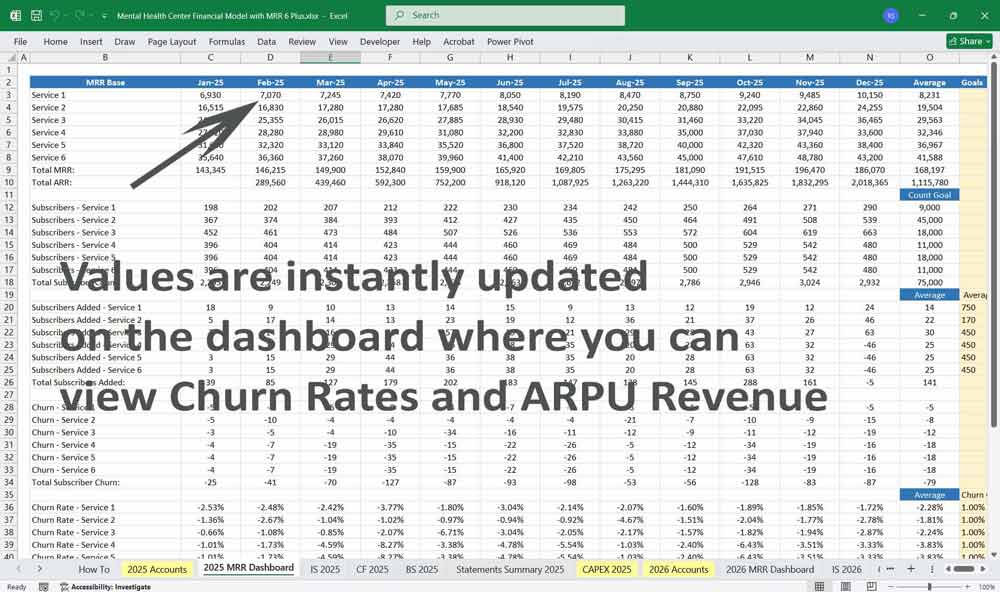
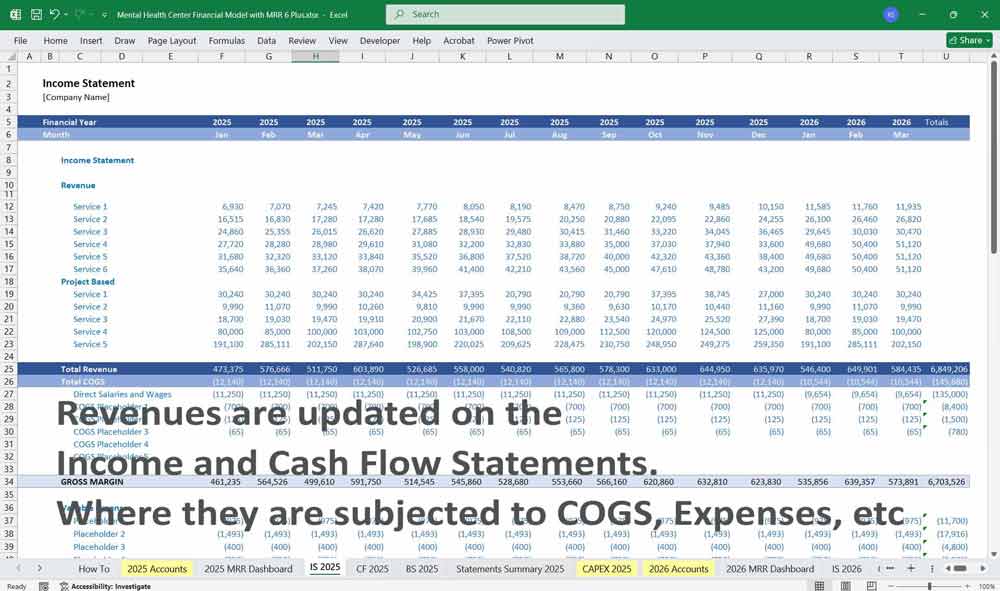
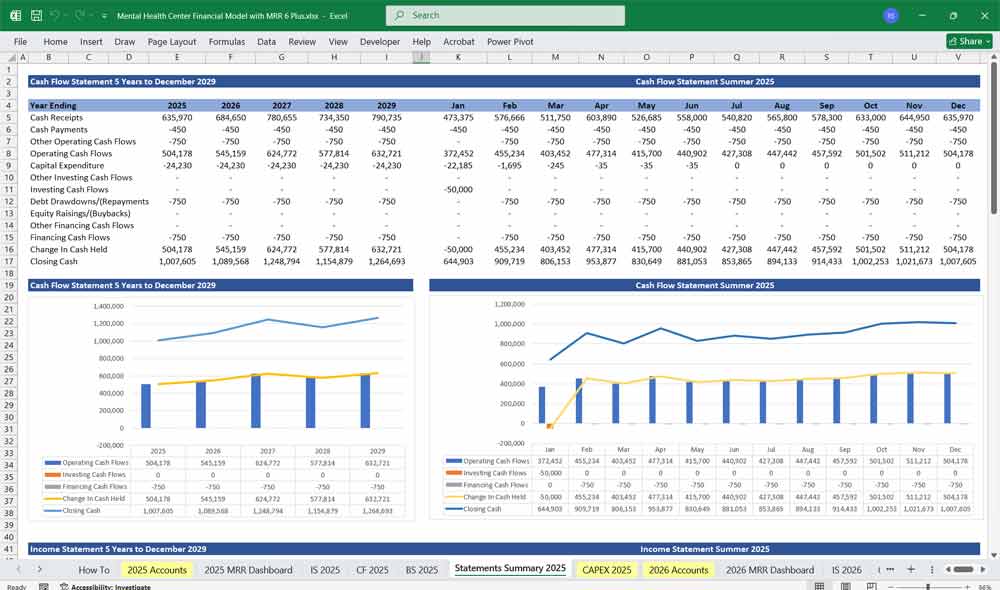
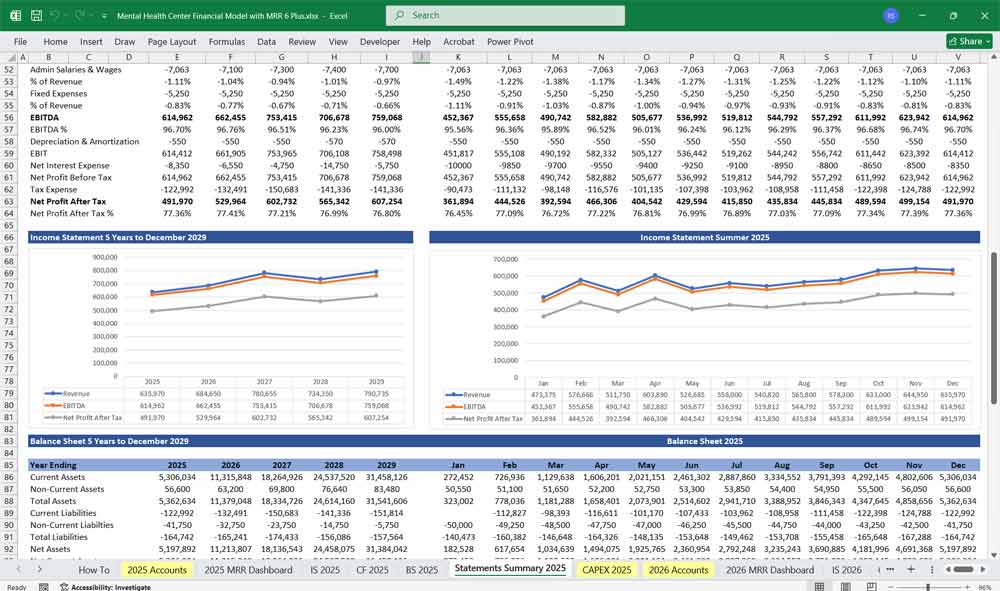
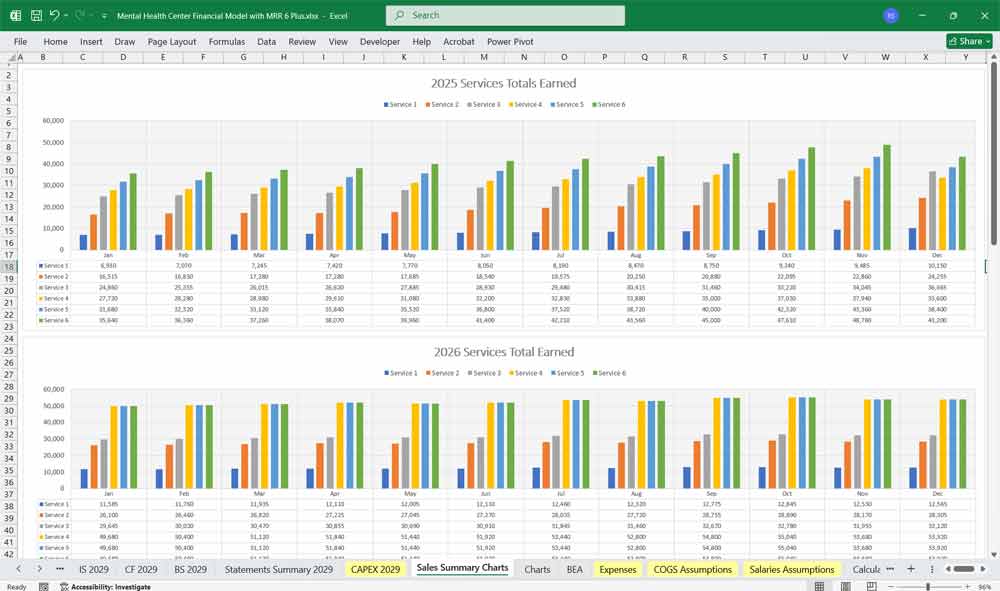
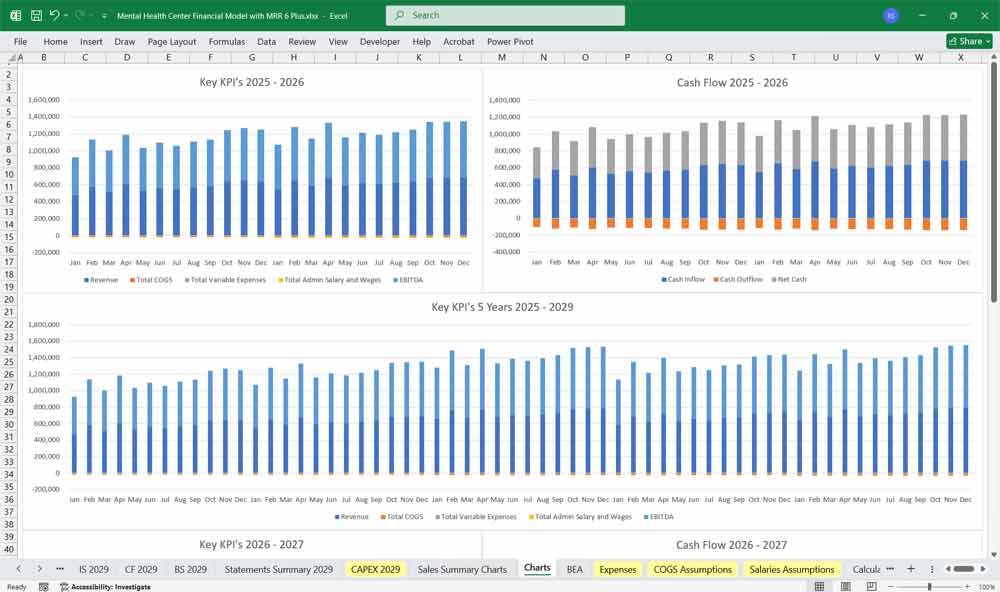
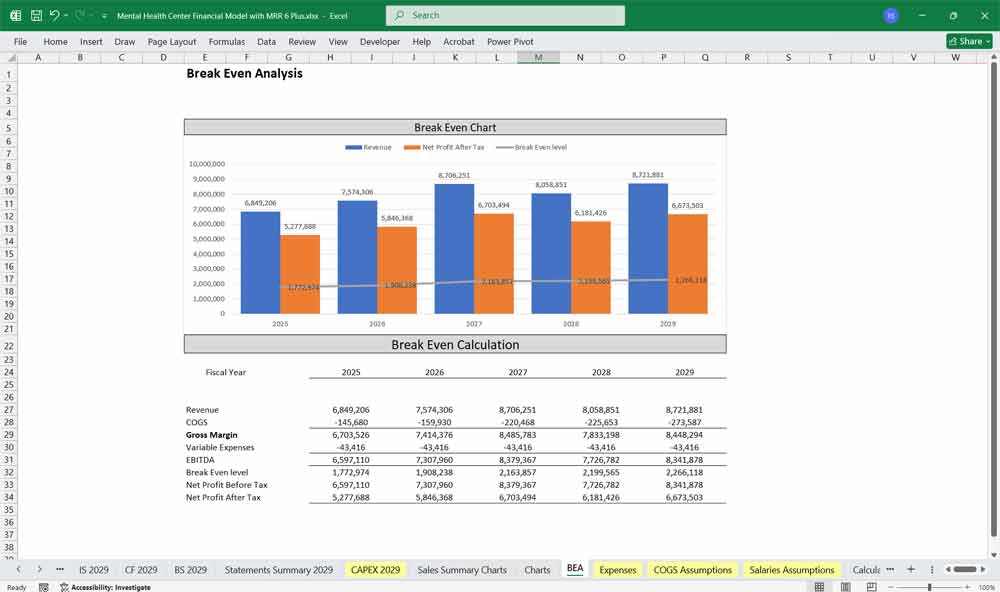
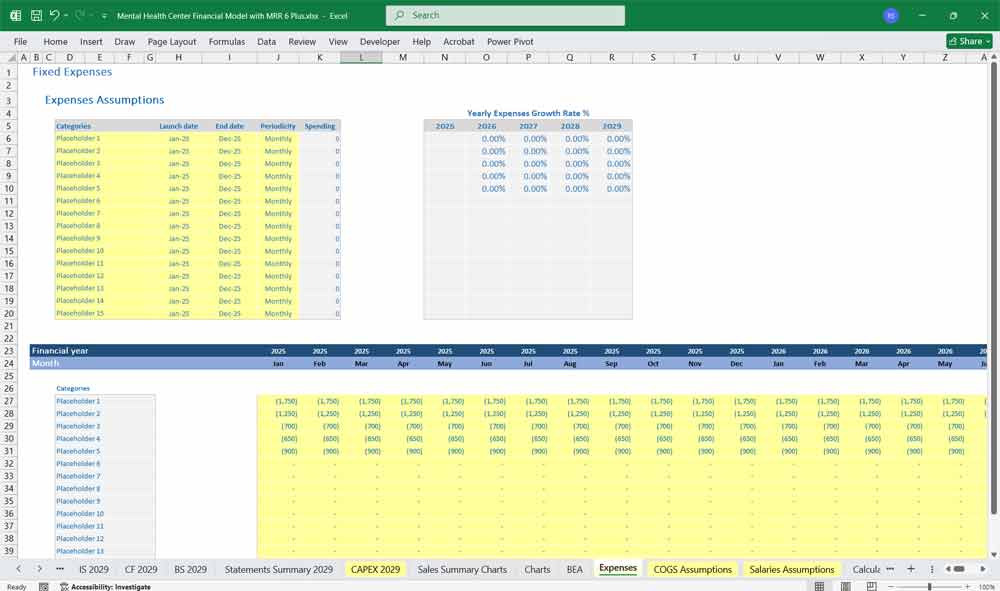
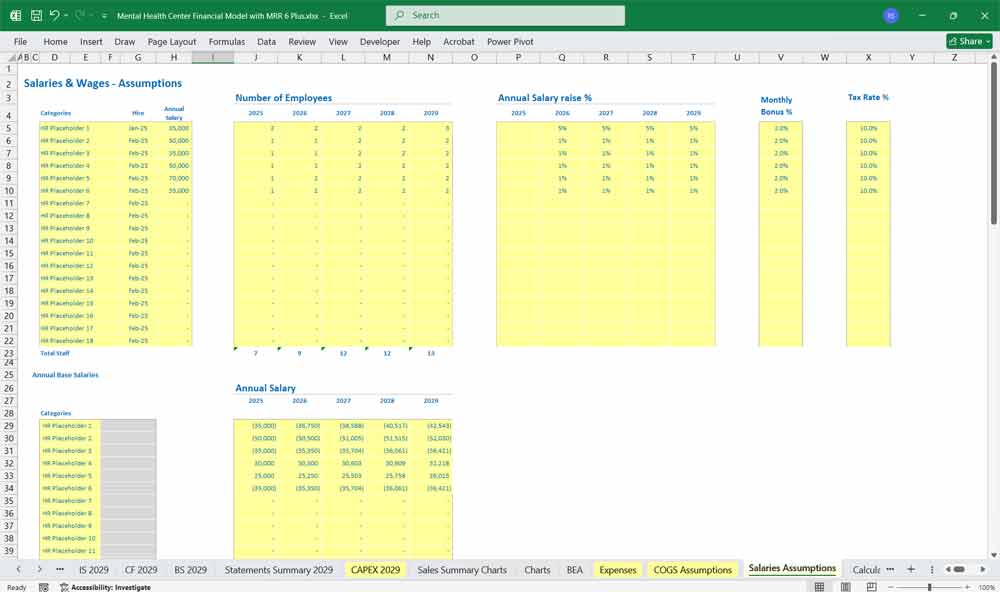
Additional Revenue Streams:
- Workshops & Seminars: Charge $50–$100 per attendee
- Corporate Wellness Programs: Offer packages for workplaces
- Telehealth Platform Access: Subscription add-ons for digital-only clients
- Community Donations/Grants: Target $50,000–$100,000 annually in funding
Conclusion for The Financial Model
This Mental Health Center financial model gives a structured approach to analyzing your company’s financial health. The 6-tier subscription model ensures flexible pricing for different customer segments while optimizing revenue potential.
Download Link On next Page
Download Link on next Page
